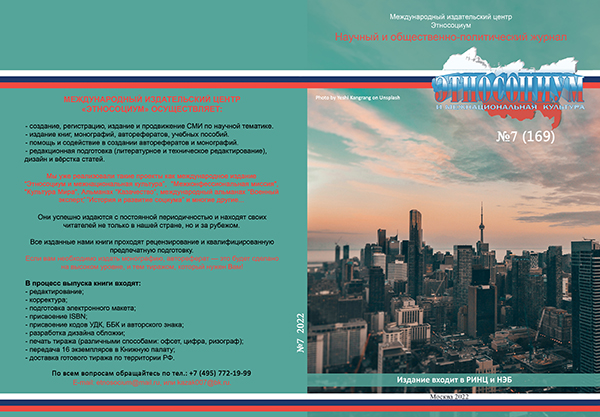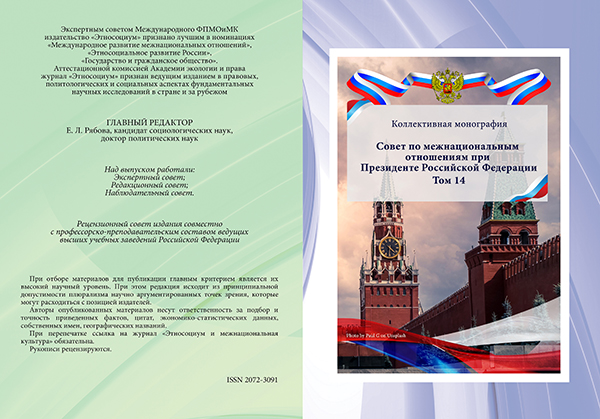

Content
|
COUNCIL OF INTERNATIONAL RELATIONSHIP. DISCUSSION FORUM
|
|
|
Rodionov M.A., Volkova T.A. Risk management in activities political elites
|
9
|
|
Bolshakov A.G., Khramova E.V. Ethno-linguistic trigger in the hybrid war between Russia and the “Collective West” (practices of telegram channels)
|
32
|
|
ACTUAL PROBLEMS OF MODERN SOCIETY
|
|
|
Daaev A.N., Ternovaya L.O. Royal sports: the impact of the sporting life of monarchical families on public life
|
45
|
|
Katorgin D.L. Regional differences in corruption in Russian regions as a reflection of ethnocultural differences
|
55
|
|
Maiorova M.A. Features of the youth policy of the countries of the post-Soviet space
|
60
|
|
REGIONAL STUDY
|
|
|
Bulakh E.V., Nebesnaya V.V., Tkachuk D.V. Municipal e-democracy: relevance, problems, solutions
|
69
|
|
Trofimova N.N. Application of Scrum methodology as a way to increase the efficiency of enterprise cost calculation systems
|
76
|
|
Novikov D.V. The beginning of the organizational activity of the associations of Shors and Teleuts in the reflection of the periodical press of the Kemerovo region
|
84
|
|
INTERNATIONAL RELATIONSHIPS
|
|
|
Gao Chaoqun, Du Yali Comparative analysis of patriotic education in China and Russia
|
93
|
|
Tambi S.A. Estonian Diaspora in the Town of Toropets
|
99
|
|
Filatov O.V. Cognitive aspect of NATO's Modern International Activities
|
145
|
|
Abstracts
|
154
|
|
Authors
|
165
|
|
Requirements to materials submitted to the international publishing house "Etnosocium"
|
169
|
A retrospective analysis of the emergence and development of scientific and practical approaches to risk management by political elites has been carried out. The modern content of the concept of political risk, trends in the change of elitist risks in a turbulent world, problems and mechanisms for managing them, methods of assessment have been studied.
Keywords: political elites, risks, management decisions, national security, anti-crisis management, information security, modeling, uncertainty, society, sanctions.
The current conditions of the hybrid war between the Russian Federation and the "collective West" form domestic political threats. One of the threats is the possibility of destabilizing the domestic political situation in Russia. The main mechanism of destabilization is the ethno-linguistic trigger. The concept of this trigger is based on the methodological symbiosis of the theory of the "third wave", the theory of PTSD and the constructivist theory of the definition of ethnicity. The practices of conducting hybrid wars show how destructive they are for many countries. The ethnic factor has a special destructive effect. On the practice of Tatarstan telegram channels, one can see how attempts are made to “shake up” the socio-political situation in the national regions of the Russian Federation. The lack of attention of researchers to the study of this problem will lead to victory in the hybrid war of the "collective West".
Keywords: ethno-linguistic trigger, hybrid war, Russia, collective West.
The article analyzes a little-studied aspect of maintaining social cohesion, in which the political institution of the monarchy, the social institution of the family and the socio-cultural institution of sports cooperate for this purpose. Sport initially arose as a form of elite activity, but at an accelerated pace in different political conditions turned into a mass activity focused on maintaining a healthy lifestyle. At the same time, in those states that retained such a form of government as a monarchy, sport proved to be a means of communication between the elite and ordinary citizens. Members of the royal families took it upon themselves to dismantle the success, dynamism, competitiveness inherent in sports and valued by society with their sporting achievements and excellent physical shape.
Keywords: sport, politics, monarchy, society, elite, Olympic Games.
Corruption is a complex social problem, and many anti-corruption policy measures turn out to be ineffective. In explaining the sustainability of corrupt practices, sociocultural factors play an important role. They manifest themselves not only at the international, but also at the subnational level. The article analyzes the differences in the level of official corruption between Russian regions from the point of view of ethno-cultural factors.
Keywords: corruption, nepotism, anti-corruption policy, regional differences.
The article examines the general features of the state youth policy in the countries of the former Soviet Union. A list of similar measures to support the younger generation is highlighted and the problems hindering the effective implementation of the policy, characteristic of the post-Soviet states, are identified. At the moment, the states of the post-Soviet space have developed an extensive regulatory framework for the implementation of youth policy and continue to improve it. It is noted that one of the external factors influencing the behavior of the younger generation is the state of the information field, foreign interference in the internal affairs of the state, as well as the degree of success in implementing the strategy of the state youth policy. After the collapse of the USSR, many players on the world stage, such as Turkey, Poland, China, etc. They are interested in post-Soviet youth and make efforts to influence the consciousness and behavior of the younger generation with the help of various "soft power" tools, which contributes to the formation of loyal lobbying groups in many state authorities, as well as influence internal processes in the country. The necessity of joint work on improving the effectiveness of mechanisms for the implementation of state youth policy, building a single ideological and value basis that promotes moral and ethical education of young people is indicated.
Keywords: youth policy, post-Soviet space, youth, leadership, the younger generation, political processes.
The article highlights the relevance and problems of the introduction of e-democracy at the municipal level of the Russian Federation, considered examples of effective regional municipal policy that ensures the development of forms of e-democracy. A list of possible approaches in the implementation of management activities is given, attention to which will improve the quality of solving issues of local importance through the resource of active involvement of citizens.
Keywords: local self-government, municipal politics, electronic democracy, information and communication technologies.
The article describes the use of flexible project management for the development and implementation of more efficient calculation systems. The advantages of the Design Science Research approach for flexible project management and Scrum methodology are considered - when developing and implementing a cost accounting system by type of activity (ABC). The presented approach emphasizes the priority parameters in the development and implementation of calculation systems. The author emphasizes that the completeness and accuracy of the calculation system are not the only key requirements for its effectiveness. It is very important that it is useful to this particular organization with its characteristics and adapted to its needs.
Keywords: calculation, cost calculation by type of activity, Design Science Research, flexible project management, Scrum methodology, project management.
The article analyzes the activities of the regional press organs of Kuzbass, to cover the interaction between regional authorities and national associations of indigenous peoples (during the formation of the latter). The main method of empirical work was the content analysis of narrative sources, which allowed the author to identify and characterize the frequency of occurrence of the relevant plots. In general, the orientation of the press to a detailed fixation of the obvious manifestations of this cooperation was noted, in the absence of attempts to reveal the mechanisms for making state decisions, and to trace the political program of national associations.
Keywords: indigenous peoples, national public associations, regional press, autonomy, territories of traditional nature management, regional national policy, Convention of the International Labor Organization.
The article is devoted to the study of patriotism and patriotic education – the topic which is especially relevant today. The author conducts a descriptive-comparative study by analyzing patriotic education in Russia and China, its history and the current position in the culture and society of both countries. The article also analyzes the definition of "patriotism" and “patriotic education”, highlights features, effective methods and general instruments of patriotic education in China and Russia. The author's view on patriotic education in China is also stated in the article. The author studies modern approaches to the process of patriotic education in Russia and China in terms of the influence of leading social institutions, such as school, family and society, which is the scientific novelty of the article. Particular attention is paid to the relationship between education and patriotism, as well as the role and relevance of the patriotic education in the education of citizens of both countries, especially modern young people. The author comes to the conclusion that patriotic education in the present days should be focused on the younger generation, and its goal should be to restore civic pride and a sense of responsibility.
Keywords: patriotism, patriotic education, modern education, China, Russia.
In this historical and ethnographical study, the author tells about the life of the Estonian diaspora in the town of Toropets (now the Tver Region of the Russian Federation). The novelty of the study lies in the fact that so far neither Russian nor foreign researchers have conducted such a large-scale and comprehensive study on this topic. The uniqueness of the study lies in the fact that the paper is based on numerous archival documents introduced into scientific circulation for the first time (obtained from the Estonian National Archive, the Archival Library of the Estonian Literary Museum, the Central State Historical Archive of St. Petersburg, the State Archive of the Pskov Region, the Central Archive of the Ministry of Defense of the Russian Federation), as well as materials from pre- and post-revolutionary newspapers in Estonian and Russian languages. The paper contains information not only about the functioning of various Estonian institutions in Toropets (Estonian schools, parishes or societies), but also about well-known and little-known Estonians whose life was inextricably linked with Toropets. The study is rich in illustrative materials. The author established contacts with the descendants of Estonian migrants, whose data significantly enriched the work.
Keywords: estonians, Russia, Toropets, Estonia, history, ethnography, culture.
It is obvious that contemporary conflicts are by no means always of an armed nature. Conflicting parties often put pressure on each other, using information and channeling it to a large extent. Starting from 2020, observations at various research centers of NATO began to note that the development of information interaction technologies is carried out to the borders of a new type of international conflict, namely "cognitive warfare". According to experts from NATO-affiliated research centers, the use of cognitive warfare methods involves the use of various information methods, as well as “neural weapons” to influence the public opinion of a certain group in order to fulfill the interests of the subject using the above methods. As part of the study, it is important to try to answer the question of whether this type is a consequence of the development of military strategy and technology, or is it another cliché used in the framework of information policy to intimidate or accuse their rivals of unleashing and escalating various international disputes. Thus, the goal of the study is to analyze the phenomenon of cognitive warfare and assess the perception and relevance of this idea in modern science. As part of the study, assumptions were made that the phenomenon of cognitive warfare since the 1990s, in one way or another in different interpretations, has been affected in various studies and, perhaps, represents only one of the subspecies of information warfare. At the same time, the relevance of this idea in NATO may be associated with the application and development of the concept of strategic communications in this organization.
Keywords: Cognitive warfare, information warfare, NATO, iHub center, information-psychological warfare, strategic communications.